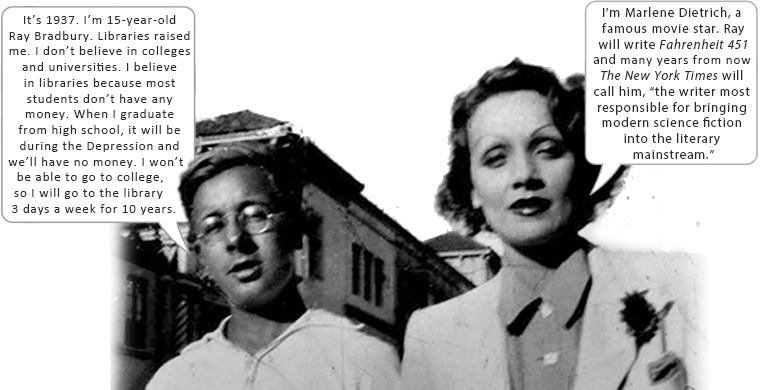George, Marlene and Me
by Ray Bradbury,
from Life Magazine, July 1991.
I began to write short stories when I was 12, on a toy dial typewriter, in Tucson Ariz. When I was 13 my family moved to Los Angeles so my dad and my older brother, Skip, could look for work during the Great Depression. I immediately headed out for Hollywood on my roller skates, searching for famous people. My first encounter was with W. C. Fields; having signed my autograph book, he cried, “There you are, you little son of a bitch!” and I was launched on a life of pestering stars.
That autumn, when I attended Berendo Junior High School, I met George Burns. Or rather, I pushed my way into his and Gracie Allen’s life. I discovered that by roller-skating three miles from my school, late on Wednesday afternoons, I could find George and Gracie broadcasting their White Owl radio show at the Figueroa Street Playhouse in downtown L.A.
In those days, September 1934, there were no audiences for most radio broadcasts. Seeing George Burns outside the theater, I skated up to convince him that he should take me and my friend Donald Harkins in to watch their rehearsals. Why George agreed, I’ll never know. Perhaps we looked as poor as we truly were. In any event, George led us in, seated us in the front row of an empty theater, and the curtain went up on George and Gracie playing to an audience of two ninth-grade kids.
That did it. I immediately began to create scripts for Burns and Allen, which I wrote in typing class when my teacher’s back was turned. I delivered them every Wednesday night to George, who pretended to read my dreadful jokes and told me my future as a writer was assured.
One of my end-spot routines did make it on their February 26, 1936 broadcast. Here it is:
GRACIE: Ohhhhhhhhooooooo!
GEORGE: Quick, somebody… Gracie has fainted…. Hurry…. Bring a glass of water…. Gracie!… Talk to me…. Gracie… say something…. Gracie… Can’t you say something?
GRACIE: Sure… this is the Columbia Broadcasting System!
MUSIC: THEME END OF SHOW
During that same year, I trapped George across the street from the Brown Derby one afternoon, and here’s the snapshot to prove it: ace comedian-raconteur with ace future writer of Far Worlds, including Mars.
More than a half century later, at a cinema awards banquet, George ran up to me, exclaiming, “Was that you, was that you? I remember you!” And we enbraced for the first time since I was a kid.
As a star-struck kid I snuck over the walls or slipped through the side doors of every major motion picture studio, only to be thrown out or chased back across the outdoor sets and over the wall, sometimes into the Hollywood cemetery.
That was the year that Hollywood Hotel, featuring Dick Powell as emcee and Louella Parsons as gossip columnist supreme, began to broadcast from the same theater as Burns and Allen. I got to know Louella, who took me in and sat me next to Gary Cooper for a broadcast of The Lives of a Bengal Lancer. Shortly thereafter I finagled a friendship with her chauffeur and talked him into letting me ride around town running errands in her limousine. The fun came when we pulled up at stop signs and people stared in trying to figure out what celebrity rode inside. I smiled back at them and waved, my roller skates on my lap.
Then Louella found out what I was up to. I was banished from the limo, only to reappear as an item in Louella’s column a few weeks later. It described an encounter between Marlene Dietrich and an autograph hound (myself) who had pursued her inside and up the stairs at the House of Westmore Beauty Salon on Sunset Boulevard. I grabbed her autograph as I was being hustled back downstairs.
Not long after the pursuit, I encountered Dietrich in front of Paramount Studios, at almost the exact spot where W. C. Fields had blessed me with his curse — and near the entrance where I would arrive 40 years later to write the screenplay of Something Wicked This Way Comes.
On that late afternoon a lifetime ago, failing to recognize this terrible child from the pursuit at Westmore’s Beauty Salon, she agreed to have her picture snapped. I suggested that since the sun was on the wrong side of the street, she might be willing to cross over. On the verge of refusal, Dietrich inexplicably relented and made the trek. Here she is, alongside her nemesis. She doesn’t look very happy, does she?
I still have my autographs and a few roller skate ball bearings left over from those days so long ago. Almost all of the people I met then are gone, but miraculously Marlene and George have survived. The light that comes out of these pictures is a constant rerun of my life as a somewhat silly but always loving boy, terribly reluctant to enter manhood.
# # # #
